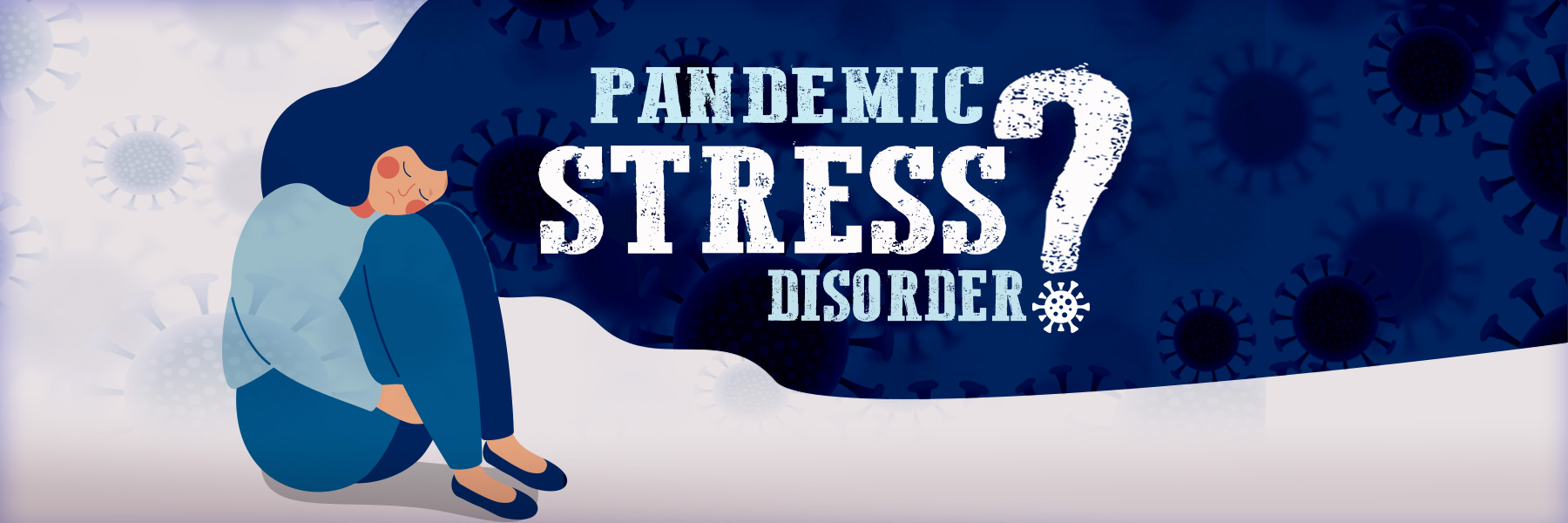How to avoid heightened anxiety during COVID-19 disruption
Refusing to leave the house, even to purchase meals from restaurants that offer curbside service. Obsessively tracking COVID-19 infection rates throughout the community, state and nation. Staying up until the wee hours of the morning just to avoid having nightmares that have become all too prevalent lately.
The prolonged COVID-19 pandemic can make anyone a bit edgy these days. But when the normal routines of life have been almost completely discarded or the underlying feelings of anxiety and dread never seem to subside on their own, additional help may be warranted.
For some people, the novel coronavirus has become much more than a major inconvenience: A monster called COVID-19 has made a home in the dark recesses of their minds, and the damage that unwanted guest may be doing is all too real.
According to a recent study by scientists at Case Western Reserve University, almost 90 percent of respondents had experienced at least one symptom of post-traumatic stress because of the pandemic, and almost 30 percent met the criteria for an actual diagnosis of Post-traumatic Stress Disorder. The Mayo Clinic defines PTSD as a mental disorder triggered by experiencing or witnessing a terrifying event.
The fact that so many Americans may be experiencing symptoms of post-traumatic stress comes as no surprise to Dr. Julie A. Schumacher-Coffey and Dr. Matthew C. Morris, psychologists and faculty members in the UMMC Department of Psychiatry who have specialist-level knowledge of PTSD and do research on the disorder.

“When we talk about post-traumatic stress, we’re looking at the impact of particular types of events; events that cause or threaten death or traumatic injury to you or someone close to you, or are witnessed by you” said Schumacher-Coffey, a professor of psychiatry at UMMC. “Because COVID-19 is recognized as a sometimes fatal illness, having it happen to you or someone in your close circle could provide the possibility of experiencing post-traumatic stress symptoms.
“Having a family member get seriously ill or pass away from COVID-19 would satisfy the definition of the kind of event that could lead to PTSD.”
“When you think of the pandemic, there’s this threat of actual death,” Morris said. “Health care workers may be faced with death or dying on a typical day, or the sudden death of a loved one may be experienced by someone in the community.
“You can have a variety of different responses to that trauma exposure. On the whole, from what we’ve seen, resilience is the norm. Many will recover on their own without the need for any treatment. But for a substantial portion, they’re going to experience symptoms of posttraumatic stress that can be debilitating.”
Compounding the problem, Schumacher-Coffey said, is the disruption the pandemic has caused to individuals’ social networks and systems.
“Everybody in the pandemic is experiencing increased levels of stress,” she said. “It varies from person to person, but the overall disruption to life and the fact that it is not anticipated to go away anytime means you have individuals experiencing trauma - potentially one or more people in your social circle or you developing COVID-19 - in the midst of numerous other stressors.
“These range from possible unemployment to disruptions to child care services or schools to social isolation - which can make us less resilient in our response to the pandemic.”

Morris said researchers in UMMC’s Center for Integrative Health have noticed the pandemic has had an impact on the mental health of those who have already suffered from PTSD.
“When you’ve struggled with PTSD in the past, having to deal with the threat of COVID-19 brings back old thoughts and feelings,” he said. “For some folks who’ve recovered or have made significant strides in treatment, the pandemic has made their symptoms worse.
“It’s complicated. One of the most significant resources for them is having a strong support mechanism. With the pandemic, it’s hugely different now - people aren’t seeing the people in their social network, they may not be going to church, all those positive factors have been taken away, which makes it more likely for people to experience impairment.”
Schumacher-Coffey suggests four “warning signs” that could indicate someone may be experiencing symptoms of post-traumatic stress, all of which must link back to a specific event or experience.
— — —
• Intrusive memories
“It just keeps popping into your head what has happened to this loved one or to you,” she said. “This might come up as a nightmare. You may have a hard time having an incident not come back repeatedly into your mind while you’re awake or asleep.”
— — —
• Avoidance
“People start avoiding things that remind them of the traumatic event, in part because it’s so painful to have these memories of what has happened,” she said. “If they are around things that remind them of it, they may have a strong reaction - their heart may race, they may experience nausea, they may start crying or run out of the room.”
— — —
• Negative thoughts
“In general, you may be experiencing negative emotions more than usual,” she said, “feeling more hopeless, blaming yourself for the event or having a hard time being close to other people without your thoughts and feeling becoming more negative.”
— — —
• Hyperarousal
“You may be more aware of or anticipate danger around you,” she said. “You may have a harder time sleeping, you may startle more easily. When people are more prepared for danger and keyed up, they might be more irritable. They feel unsafe, and their body is more ready to face danger because they perceive it as being everywhere.”
It’s important to note that all of these responses are “normal,” and almost everyone will have some of them if they’ve experienced a traumatic event, Schumacher-Coffey said. “But with all these experiences, you definitely want to pay attention. If they get less and less over time, until the person is pretty much back to normal, then it’s probably not going to become PTSD.
“If they don’t seem to be getting any better or are actually getting worse to the point they interfere with the person’s day-to-day life - they’re not interacting with people, they don’t do what they need to do to take care of themselves or they don’t get out of bed in the morning - then they could be an indication that the person may need help.”
Morris said in the extreme, these symptoms could lead to long-term consequences at work, at home and in social relationships.
“These may cause you to miss work or have difficulty concentrating while at work,” he said. “You may lose sleep at night or have nightmares because you don’t feel safe. People may just feel like they’re on edge all of the time.
“Any thoughts of not wanting to be around anymore - there’s a higher risk of suicidal thoughts in individuals who have post-traumatic stress. PTSD frequently occurs along with symptoms of depression: feeling really down, not being interested in anything, giving up on activities that you normally enjoy.”
So what can people do to help if they notice these symptoms in a loved one? The first step is to listen, the experts said.
“Our recommendation is not to force anyone to talk about things they don’t want to talk about, but if you notice a loved one having trouble, ask if they feel like talking about it,” Schumacher-Coffey said. “And if you have experienced trauma and feel like talking about it, find supportive people to talk about it.
“If you’re feeling an urge to talk about it, that’s your mind seeking to process the event. Talking about it can help you process what you’ve been through, move past it and start to feel better. So if you notice that someone you are close to is having difficulty, be clear you’re willing to listen if they want to talk about it.”
Morris suggested two strategies that could help someone recover from a traumatic experience.
— — —
• Allow the process
“For many who experience the cycle of not being able to get the event out of your head, they avoid thinking about it,” he said. “Try not to avoid those images or memories or uncomfortable feelings - allow yourself to have them. It may seem this is the opposite of what you would want to do, but actively pushing it away, we think, disrupts memory consolidation and healing.
“Memory is like a file cabinet - the traumatic memory is a file that is floating around your brain with nowhere to put it. Allowing yourself to experience the memory without pushing it away is one important strategy we think can help an individual process what they’ve been through. The goal is to be able to file this memory away so that you gain more control over how and when you think about it.”
— — —
• Grounding strategies
“Bring yourself into the present moment,” he said. “With post-traumatic stress, you’re constantly dragged into the past, into those memories. You become disoriented because it feels like you’re not in the here and now.
“You can do things like describing everything around you, what you are seeing, hearing and feeling right now, become oriented to what day it is today, what time it is right now. For example, you might wake up from a nightmare feeling disoriented, but splashing cold water on your face and focusing on that sensation makes it harder to be pulled back into the past.”
For long-lasting mental health, Schumacher-Coffey said nothing beats basic self-care.
“We’re finding more and more that getting enough sleep, eating a nutritious diet, getting enough exercise and routinely managing medical conditions all matter to our mental health,” she said. “If we let any of these slide, it can have a negative impact.
“It’s also important to listen to your emotions and, if you’re feeling very stressed or overwhelmed or not ok, don’t just muddle through and keep going - take some breaks. When you’re feeling run down or stressed out, incorporate more rest and relaxation. Read a book, take a walk, engage with friends on social media or try a relaxation app.”
If someone just seems unable to cope with “life in the time of COVID-19,” however, the experts suggest seeking professional assistance.
“For people who have never had mental health issues, they could reach out to their general practitioner or a nurse practitioner and let them know what’s going on,” Schumacher-Coffey said. “These professionals can connect them to the kind of help they need.”
Whenever the COVID-19 pandemic leaves you stressed, remember to take care of yourself, Schumacher-Coffey said.
“If you’re not feeling ok, the first step is to try to relax,” she said. “Try to find someone you trust who’s supportive, who you can talk to and, if you’re having more intense feelings of negativity, don’t be afraid to reach out for some counseling.”
“We’re all experiencing COVID-19 as a chronic stressor,” Morris said. “It’s important for people to maintain their daily routines, even if they’re working from home. Still get dressed, wash up, and if safe, leave the house from time to time, get exercise and try to maintain a regular sleep schedule. All those things are important in a preventive way.
“UMMC has seen an explosion of telehealth services, and for a lot of people, that’s huge. A lot of people who may not want to commit to coming in and seeing a counselor on a weekly basis can now do so from the comfort of their own home. And many of the techniques we use can be delivered to them through telehealth.”
Physicians can refer patients with post-traumatic stress symptoms to counselors at UMMC. The Medical Center’s Office of Well-being also offers a list of effective coping strategies for the public. To view this list, visit /CoronaVirus/files/CoronavirusResources.pdf.
The above article appears in CONSULT, UMMC’s monthly e-newsletter sharing news about cutting-edge clinical and health science education advances and innovative biomedical research at the Medical Center and giving you tips and suggestions on how you and the people you love can live a healthier life. Click here and enter your email address to receive CONSULT free of charge. You may cancel at any time.



